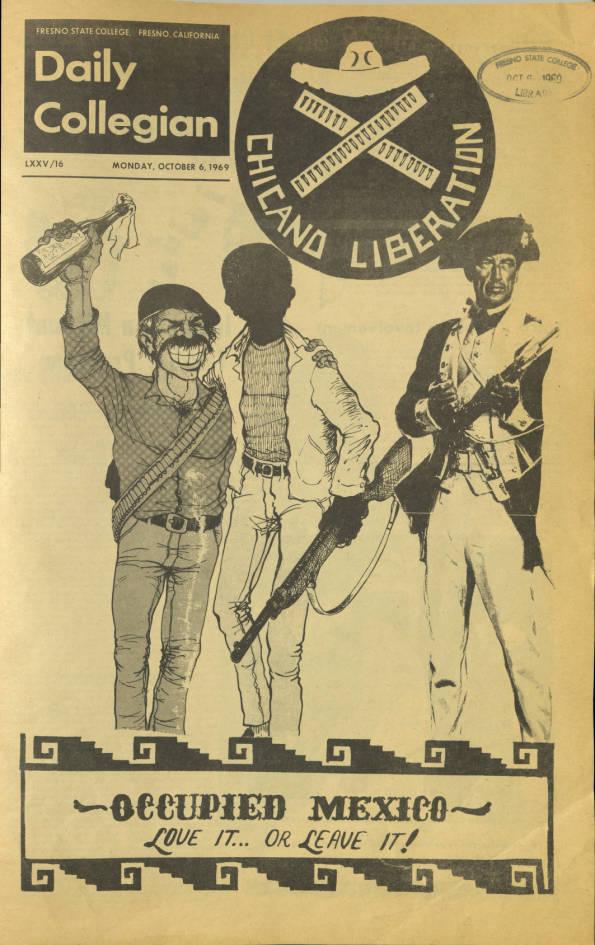This story is a continuation of The Collegian series in celebration of its centennial anniversary, which looks back at historical moments in the publication’s history.
For this feature story, this paper focuses on the first few issues of the Latinx supplement La Voz de Aztlán and one of the most recent supplements, The Asian Pacific Review (APR).
The Roots of La Voz de Aztlán
The origins of La Voz de Aztlán dates back to the first time The Collegian included a special edition supplement on May 5, 1969, under the name La Pluma Morena or The Black Pen.
The date of the first publication was significant to the minority supplement as it fell on the same day as Cinco de Mayo, when Mexican revolutionary forces defeated the French forces in the battle of Puebla in 1862.
La Pluma Morena advertised itself as the missing voice of the people of color in news media at The Daily Collegian, according to the editors in an editorial in the supplement.
“Its contents and posture will and should reflect our combined points of you, for it has been gained through our efforts, yet we have also gained it for all those students who need it. And those in our community who have been left out of the scheme of things will be urged to contribute as well for they have much to say,” the editors wrote.
The First Issue of La Voz de Aztlán
La Voz de Aztlán made its official debut on Oct. 6, 1969, bearing striking resemblance to La Pluma Morena with imagery of Mexican revolutionaries under the banner of Chicano liberation on the front page.
The supplement paper was directed toward the Chicano and Native Americans at Fresno State, or at the time Fresno State College (FSC), whom at the time constituted 7% of the student population, according to the FSC’s 1969 facts book. The supplement paper discussed news events relevant to students in those communities on and off-campus, such as the Delano grapes boycott, immigrant rights and Chicano education.
The supplement team consisted of Carlos “Chale” Martinez Jr., Ramon Chacon, Fransisco Rodriquez, Paul Graham, Lehman H. Brightman, Leonard Smith, Omar Salimas, George Olveda and Ernesto Trejo.
The most prudent issue on campus for Chicano students at the time was minority education, support for the ethnic studies program and the Equal Opportunity program, with the firing of assistant English professor Robert Mezzy.
Programs like the ethnic studies or equal opportunity programs were seen by their minority students and staff as being at risk of closure by the same pressure that canceled Mezzy and eventually ethnic studies applicant Marvin X.
The staff of La Voz de Aztlán published content it believed accurately portrayed the feelings of Chicano and Native American students at FSC.

The Asian Pacific Review
Much like its contemporary supplement counterparts, APR primarily focuses on news and events affecting Asian and Asian Americans.
“The goal for this slice of The Collegian will be to inform and entertain. Staff members will help to highlight and exemplify issues affecting our Asian American Pacific Islanders student population and community at large,” said Jesus Delgadillo, current editor-in-chief of APR
The supplement hadn’t published a paper since 2018, but it released its comeback issue on March 8. The APR’s most recent issue discussed spam musubi, Hmong New Year and introduced the new APR staff.
The APR is written by editor-in-chief Delgadillo and staff writers Katie Xiong, Yengtaova Yuatongjerxiong and Vanessa Rosario.
Delgadillo first applied for the position of staff writer in November 2021, citing his affinity for writing as well as his initial major being media communications and journalism.
He eventually applied for the editor-in-chief position following a discussion with APR faculty adviser BoNhia Lee. Delgadillo was motivated in part because he wanted to help with the resurrection of the supplement as it had not been published in years.
“I wanted to participate because I wanted the opportunity to show my writing ability and be able to contribute to the supplement. The paper had been unpublished for a few years, and I wanted to help bring it back to campus,” Delgadillo said
He expressed gratitude for having the opportunity to work at a supplement newspaper as it allowed him to bring to light issues affecting students of color.
“It feels great knowing that there are supplements which give the point of views for students of color. Reading the ethnic supplements also gives me a new perspective and insight into the importance of providing a space for content that our student groups would be interested in reading.” Delgadillo said.
He said that there should be more awareness for the increase in anti-Asian hate due to the pandemic.
Delgadillo noted that if anyone is interested in becoming a staff writer for the APR, they should reach out to their faculty adviser at bonhia@csufresno.edu for more information.
“I would like to thank our readers for supporting and engaging with the content that Asian Pacific Review will be writing. I would also like to tell our readers to continue looking forward to new printings of APR when it resumes distribution in the Fall 2022 semester,” he said.





